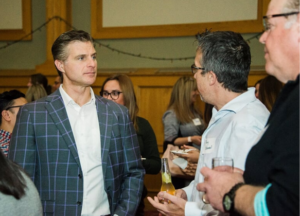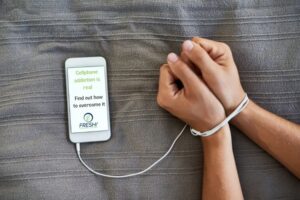I’m a HUGE fanof technology. It’s an amazing tool that has incredible benefits in almost every area of life.
However, for too many people and companies, technology is the primary source of physical, mental, and organizational challenges.
This happens when we let technology control us, instead of using it as a strategic tool in our work and life.
This mindset shift is at the heart of today’s digital device tips…and the key to boosting your daily health, happiness, and effectiveness.
Sure, you’ve heard about healthy use of technology before…but are you practicing it?
Even simple acts like taking strategic “tech timeouts” at certain times each day and week are essential to managing stress, boosting your energy, focus, and simply living a happier, more fulfilled life. However, few people actually do it.
After you finish reading this article, I encourage you to put your phone down, ditch the digital fatigue, and engage with the real world…even for a few minutes.
Let’s dive in!
Digital device addiction is a real thing. Because technology is so pervasive, for many people it can be challenging to even know where to start addressing the problem.
The first step is to understand the scope of the issue.
We must then set healthy boundaries related to our time, energy, and long term performance
Here are three simple ways you can minimize your device usage while increasing your health and vitality:
- Actively immerse yourself in the outdoors
- Go on a low information diet
- Build IRL relationships
Actively Immerse Yourself in the Outdoors
 This first point is a game changer. The majority of modern society spends far too little time active or experiencing nature.
This first point is a game changer. The majority of modern society spends far too little time active or experiencing nature.
It’s universally accepted that being active is a boon for performance and productivity. Combined with the fact that neuroscience has demonstrated the incredibly positive effects of nature on our brain, body, and happiness, it makes sense to combine the two as often as possible. See my podcast episode with Dr. Ty McKinney for more info www.timborys.com/podcast.
I can already hear people saying…”I don’t have time for this!”. The response is…Yes, you do. And it may just be the best thing you can do for your health, happiness, focus, and performance at work and home. It’s just a matter of choosing to do it.
The bonus is that it doesn’t need to be complicated. I’m not talking about multi-day backcountry treks through the remote wilderness! Keep it simple, especially at the beginning. You will see tremendous benefits from a daily 20 minute walk through your local park. While you are walking, practice your posture and breathing while being mindful of the nature all around you. Heck, even walking on the treadmill while looking out the window at a green space provides some additional benefits!
Go on a Low Information Diet
 We are bombarded with information, marketing, news, and notifications every minute of every day. High performing people not only take tech breaks, but they maximize their use of technology by cutting out the distractions and non-important information.
We are bombarded with information, marketing, news, and notifications every minute of every day. High performing people not only take tech breaks, but they maximize their use of technology by cutting out the distractions and non-important information.
This includes turning off MOST notifications all the time, and ALL notifications some of the time. Designate specific “focus” times each day where all notifications are off. Set aside tech-free windows each day for resting, recharging, and connecting with real people (see the next tip for more details)
A low information diet also means cutting back on the news, social media, and “fluff” that you normally engage with each day. It’s time to lose the “who me!?” look. You know exactly what I mean!
Unless it’s your job and you are getting paid for it, there’s no benefit to reading a dozen articles on the drama in the British Royal Family. Likewise, spending an hour (or more) doom scrolling through your social media feed is time poorly spent. Plus, it saps your energy and reinforces a negative mindset (don’t believe me, check out the research – Links below).
Again, you’ve heard this…but are you practicing it each day? These are simple strategies, yet most people don’t implement them because it’s “easier” to maintain the status quo.
Build IRL Relationships
 Technically, this is getting much easier to do now that pandemic restrictions have been lifted. However, practically, many people are out of practice when it comes to socializing in real life.
Technically, this is getting much easier to do now that pandemic restrictions have been lifted. However, practically, many people are out of practice when it comes to socializing in real life.
The psychological, social, and even business benefits of real world relationships are yet another reason to unplug and get out there to meet and engage with people in real life. Whether it’s for work or personal reasons, the upside is substantial.
In-person connections are one of the biggest missing pieces of the mental health puzzle throughout the pandemic. Plus with the massive focus on digital communication, in-person connections have become even more powerful…when used effectively.
Aim for at least one genuine in-person connection each week. Bonus if you do one for work, personal, and in a social group each week. Just unplug, talk, and have FUN!
As mentioned at the beginning, digital technology tools provide many incredible benefits to our live, but they are simply tools. It’s up to us as human beings to learn how to best use them to improve our life. This is very different from letting technology rule us each day.
By understanding the impact of your technology habits on your physical and mental health, happiness, wellbeing, sleep, stress, self-image, social connections, and performance in life, you put yourself in a position of power. You then have the ability to make daily decisions that improve your health and performance. This all starts with awareness, and a desire to change.
Think, Move, and Be Well
CEO
FRESH! Wellness Group
P.S. Would you benefit from coaching to transform the success habits in your life? Just DM me and we will set up a time to connect.

